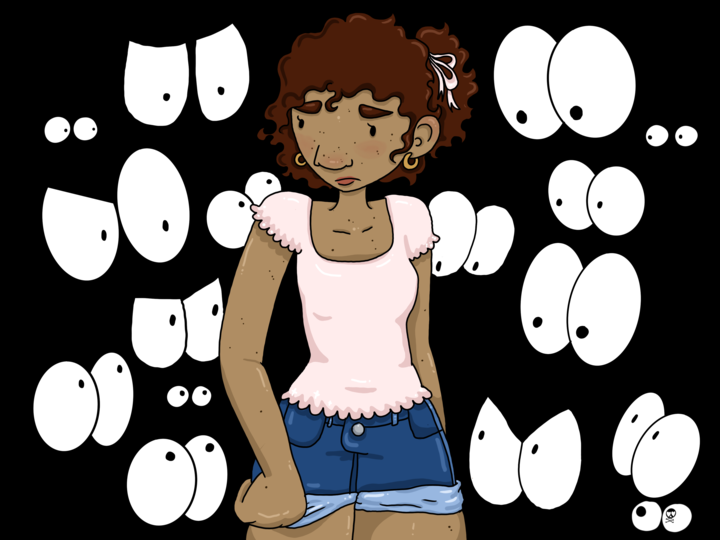Dress code can limit student expression
April 3, 2023
Last year, when Charlotte Satalic was in ninth grade, she was told by a faculty member during the school day that the shorts she had to wear with her jersey for a volleyball game violated the dress code. The faculty member said her body was hanging out and asked Charlotte if she had a change of clothes.
For many students, clothing can be a way for them to express themselves and their identity. Deciding what they’re going to wear allows them to experiment and come into their own, especially during their formative high school years. Although not often enforced at U-High, teachers and administrators can determine whether a person’s clothing is not “school appropriate.”
Although it isn’t often talked about, many students feel the dress code has specifically targeted girls, which can have harmful effects.
Charlotte has had incidents of being “dress coded,” but the lasting effect for her is the uncomfortable feeling she had after.
Charlotte said, “The thing is, it was just uncomfortable knowing that a teacher was, like, looking at my body in that kind of way. It just made me uncomfortable.”
Most times it’s not comments from other students that make someone uncomfortable. But it’s the fact that an adult is looking at her body and clothes as something that is “sexual” or “inappropriate.”
“Classmates are a lot better with how they perceive your clothing. They don’t comment on it, even my friends, like, if they think that’s something is, like, a little showy,” Charlotte said. “Then they’ll tell me just in case of the dress code, not because they, like, want to make me feel bad or something. But for teachers, it’s mostly just like, you don’t want them to, like, see you a certain way.”
Charlotte isn’t the only one who has been at the receiving end of the dress code. She said her friends have had a harder time when it comes to being told to change or that they’re not wearing something that’s appropriate for school. Not only was it embarrassing, it started to eat away at their self-esteem.
“I think that my friends have experienced a harder time with the dress code. Like, last year, they would get dress coded like every single day,” Charlotte said. “It would make their self-esteem go down. It’s just like, the whole thing is very, like, inherently bad. And also kind of inappropriate.”
Like Charlotte and her friends, senior Lauren Tapper has heard some passive aggressive comments from teachers about her clothing.
“I’ve definitely had teachers make, I think, inappropriate comments to me about my clothing when I thought it was completely fine,” she said, “but it doesn’t happen to an extent that would stop me from wearing what I want to wear.”
Discovering how clothing can be a form of expression, sophomore Ace Ma started caring about how they dressed in 8th grade and into high school.
“When I was lower school to 7th grade, I just did not care what I wore, and so I dressed kind of terrible,” Ace said. “But when I got to eighth grade and high school, I saw a bunch of people dressing well, and so I was like, ‘I want to try it.’ So I started putting more thought into what I wear and what I present myself with. Dressing well makes me feel more confident, and also I just like to look good.”
Ana Campos, dean of students, feels the dress code is applied liberally at U-High and doesn’t interfere with a student’s individuality and expression. She said she never judges a student’s taste in clothes or body type when she talks with a student about what they are wearing.
“School is preparation for later life,” she said, “and there are standards in work and other areas of life where people need to dress for the occasion.”
Similar to Ace, Isadora Glick, a junior, feels it’s important to have confidence in what you’re wearing and that the dress code can block that confidence from being created in a person.
“So I definitely think that, like, being perceived as somebody who shows a lot of skin or doesn’t show a lot of skin makes an impact on confidence and just willingness to express yourself and what you want to wear for sure,” she said. “I think that it’s really important that, like, dress codes don’t hinder people’s ability to express themselves in their clothing, outside the dress code.”
The dress code’s vague wording could be part of the problem, giving anyone the opportunity to say someone is breaking the dress code.
“So I guess I would just say that I don’t think that leaving so much of the interpretation up to the community itself, in terms of how to respond to the dress code is always entirely helpful,” Isadora said. “Because then it just makes it easier, I think, for individuals to kind of say somebody was breaking the rules without having anything to back it up.”




























































